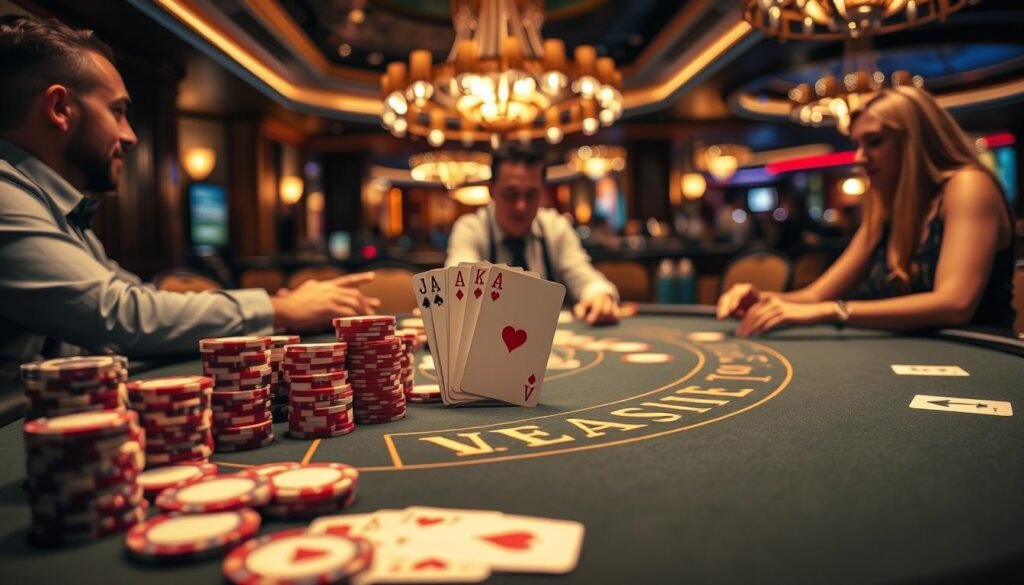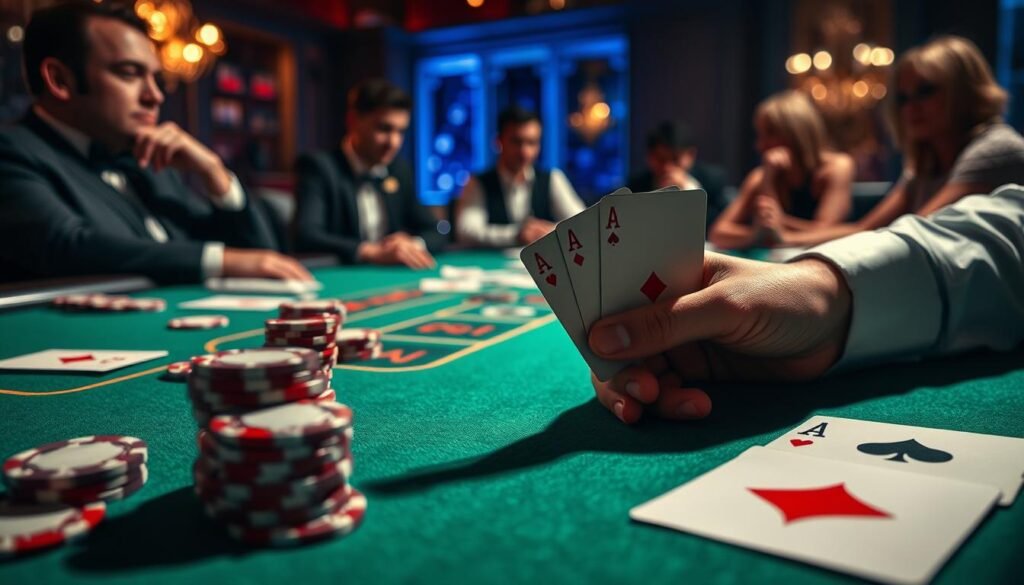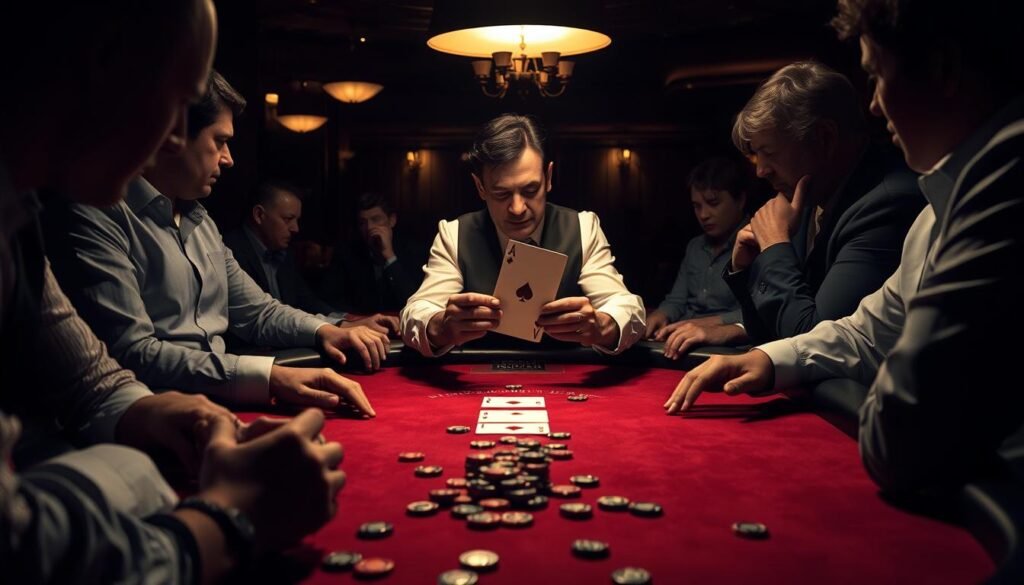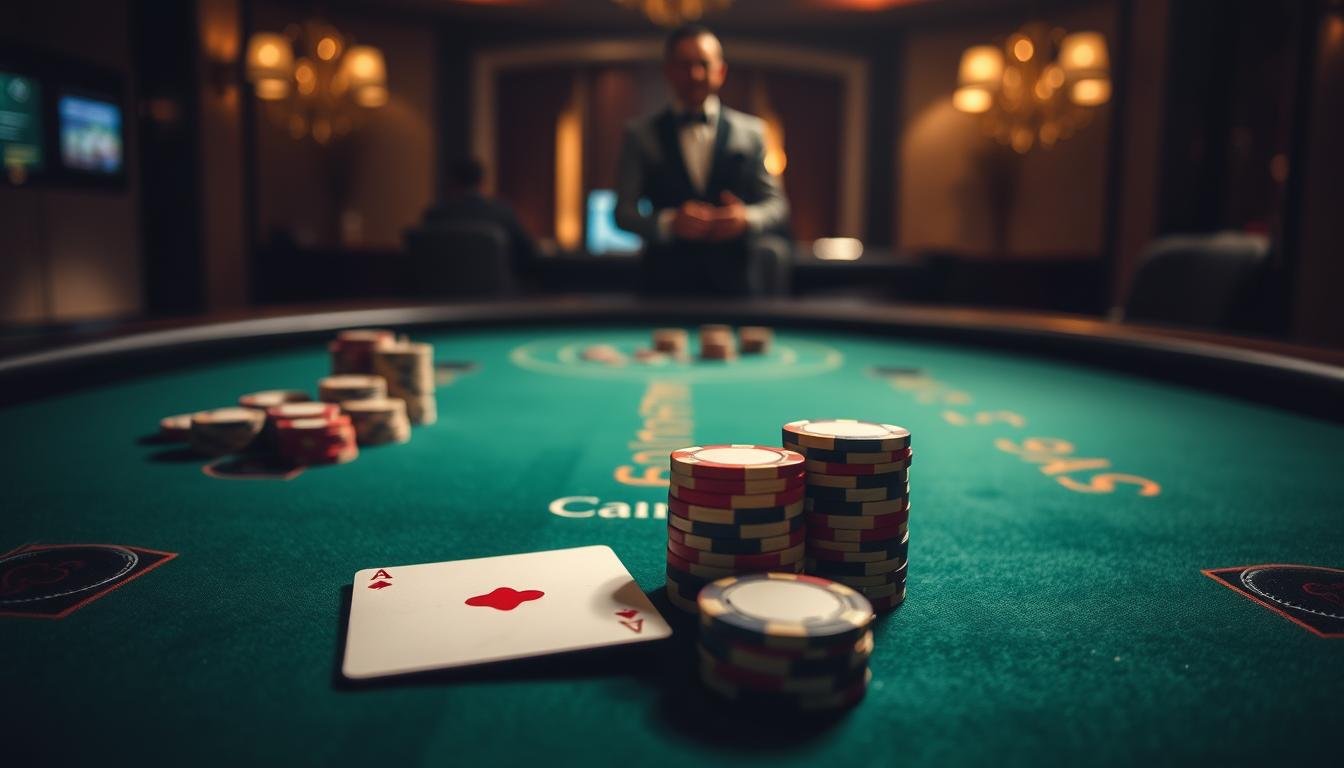Ever wondered why some blackjack players take an extra bet called “insurance”? What’s behind this enigmatic insurance, and how does it affect your blackjack strategy? We’ll explore the world of blackjack insurance, its complexities, the risks, and the odds to consider before betting.
Key Takeaways
- Blackjack insurance is a side bet that protects you against the dealer having a blackjack.
- The insurance bet pays 2-to-1 if the dealer has a blackjack, but the odds of the dealer having a blackjack are slim.
- Insurance is generally considered a bad bet due to the house edge, which can be as high as 8.5%.
- Only take insurance when you have a strong hand and the dealer’s up card is an ace.
- Blackjack insurance is more common in European and online casino games that use multiple decks.
Understanding Blackjack Insurance
What is Insurance in Blackjack?
Blackjack insurance is a side bet in blackjack. It’s offered when the dealer’s upcard is an Ace. It pays 2-1 if the dealer gets a natural blackjack (21).
Players can bet half of their original wager on the insurance line. If the dealer doesn’t have blackjack, the player loses the insurance bet. The game then continues as usual.
Insurance bets must be at least half of the initial wager. By betting on insurance, players can win money, no matter the game’s outcome. Yet, insurance is often seen as a bad bet because the dealer’s chance of having blackjack is low.
In blackjack, the odds are not in favor of taking insurance often. The dealer’s face-down card is worth 10 points only about one-third of the time. If the dealer has blackjack, the insurance bet wins at 2:1 odds.

Blackjack Insurance can only be made when the dealer’s upcard is an Ace. Players can bet up to half their original bet for insurance. If the dealer has Blackjack, the insurance bet wins 2 to 1.
When to Take Insurance in Blackjack
Deciding when to take insurance in blackjack strategy can be challenging. But knowing when to do it can boost your winning chances. Insurance bets are side wagers that the dealer has a blackjack. They pay out 2-to-1 if true.
It’s wise to take insurance when the dealer’s upcard is an Ace. This is because the dealer likely has blackjack. This bet ensures you at least break even on the hand. It’s also good if you have a low-value hand, like 16 or less. This is because drawing another card could make you bust.
However, casino games and gambling etiquette suggest avoiding insurance bets. The house edge on insurance is nearly 6%. This makes it a bad long-term bet. Card counters might take insurance, but for most players, it’s better to skip it.
| Scenario | Should You Take Insurance? |
|---|---|
| Dealer’s upcard is an Ace | Yes, the dealer has a high chance of blackjack |
| You have a low-value hand (16 or less) | Yes, insurance can minimize losses if you bust |
| All other scenarios | No, the house edge on insurance is too high |
When deciding to take insurance in blackjack, think carefully about the odds and your hand. While it can be helpful in some cases, the high house edge makes it risky for most players.

Risks of Taking Insurance in Blackjack
Playing blackjack can be tricky, especially when it comes to insurance bets. They might seem like a way to protect your wins, but there are downsides.
The insurance bet always costs you money, even if the dealer has a blackjack. It’s only worth it if you’re sure the dealer has a blackjack and you’re okay with the extra cost.
Also, insurance only protects one hand, not all hands at the table. If you have more than one hand and the dealer has a blackjack, the insurance only covers the hand you bet on.
Lastly, taking insurance is like betting on something you can’t control – whether the dealer has a blackjack. The house edge on insurance bets is high, around 5.8% to 7.5%. This is much higher than the 0.5% house edge of the blackjack game itself.
So, while insurance might seem tempting, the risks often outweigh the benefits. Blackjack strategy experts usually advise against it. They say it doesn’t offer good enough odds to be worth it in the long run.
| Statistic | Value |
|---|---|
| Probability of winning an insurance bet when the dealer has a 10 point card in the hole | 61.74% |
| Probability of losing an insurance bet when the dealer has an ace and a nine | -69.13% |
| Overall expected loss on insurance bets | -7.40% |
| Probability of the dealer having a 10 in the hole, resulting in a Blackjack tie | 0% |
| Probability of the player winning their full three to two on their wager when the dealer does not have a 10 in the hole | 103.88% |
| Expected gain in declining even money when the player has a blackjack and the dealer has an ace up | ~104% of the bet |
| House edge for the insurance side bet in blackjack | 5.8% to 7.5% |
These stats show the risks of taking insurance in blackjack. They highlight how the bet is often a disadvantage, leading to a negative outcome over time. Knowing these risks is key to developing a good blackjack strategy and making smart choices at the casino games table.

“Experts generally advise against taking blackjack insurance, indicating that it should only be used by seasoned professionals as it does not provide good enough odds to payout ratios.”
The Odds of an Insurance Bet
In blackjack, the odds of winning an insurance bet depend on the dealer’s chance of having a blackjack. The dealer’s chance with an Ace upcard is 31.5%. This means players will lose 48.7% of the time and win 31.5% of the time. It’s not wise to take insurance, as the house edge is too high at 8.5%.
Understanding the Probability
The odds of the dealer making a blackjack are 9 to 4 on average. But, the insurance bet has a 3% house advantage. The dealer has a 10-point card 30% of the time. Insurance bets lose players more than half the time, with a payout of 2 to 1.
Skilled players might improve their odds with basic strategy and card-counting. But, the number of decks used can affect the odds. Higher decks make losing the insurance bet more likely. Players essentially give the casino a 3% discount with each insurance bet.
| Statistic | Value |
|---|---|
| Average odds of the dealer making Blackjack | 9 to 4 |
| Insurance bet house advantage | 3% |
| Dealer has a 10-point card | 30% of the time |
| Insurance bets lose players | More than half of the time on average |
| Insurance bet payout | 2 to 1 |
The odds of winning the insurance bet in blackjack are 9/4 against the player. There are four out of 13 card types that could result in a dealer blackjack. The house edge for the insurance bet is almost 6%.
Even money in the case of a player having a blackjack against a dealer’s ace can yield varying results. This depends on whether the blackjack payout is 3 to 2 or 6 to 5 tables.
The trend towards blackjack tables paying 6 to 5 has significantly impacted player participation in the insurance side bet. Casinos’ profitability can be influenced by the time spent offering insurance. Few players opt for it. The possibility of insurance being phased out in casinos due to decreasing player participation has been suggested.
Playing Blackjack Online with Insurance
Playing blackjack online is now a favorite for many casino fans. Sites like William Hill Vegas have lots of casino games, including live blackjack. It’s key to know the rules, strategies, and how to use insurance bets to win more.
The insurance bet in blackjack can be helpful but comes with risks. It costs half your bet and pays 2 to 1 if the dealer gets Blackjack. You’ll get 1.5 units back about 30% of the time, as the real odds are lower than the payout suggests.
When playing blackjack online, follow good gambling etiquette and blackjack strategy. Know when to take insurance, as the house edge varies. Skilled players might find insurance profitable when the count is +4 or higher, showing a deck full of Tens.
| Statistic | Value |
|---|---|
| Insurance Bet Cost | 50% of the original bet |
| Insurance Payout Odds | 2 to 1 |
| Expected Return on Insurance Bet | -48.7% |
| House Edge for Insurance Bet | 8.5% |
| Probability of Dealer Having Blackjack with Ace Up-card | 31.5% |
Understanding playing blackjack online and insurance bets can improve your game. While insurance is useful, always consider the risks and odds. This way, your online casino games will be fun and safe for your wallet.
Conclusion
In conclusion, blackjack insurance is a side bet made when the dealer’s upcard is an Ace. It pays 2-1 if the dealer has a natural blackjack. However, it’s not usually recommended because of its high house edge.
The odds of winning an insurance bet in blackjack change based on the game setup. In single-deck games, there’s a 30% chance of winning. But, players often lose more than half of their insurance bets. Using more decks, like in Double Deck Blackjack, makes losing the insurance bet even more likely.
Understanding blackjack insurance helps players make better choices. It’s key to weigh the risks and odds before placing an insurance bet. This can greatly affect your casino games and gambling etiquette strategies.
FAQ
What is insurance in blackjack?
Blackjack insurance is a side bet in some game versions. It lets players protect against the dealer getting a blackjack. If the dealer gets a natural blackjack (21), insurance pays 2-1. Players bet half their original wager on the insurance line.
When should I take insurance in blackjack?
Take insurance when the dealer’s upcard is an Ace. This is because they likely have blackjack. It ensures the player breaks even if the dealer wins. Also, consider insurance with a low hand (16 or less) to avoid busting.
What are the risks of taking insurance in blackjack?
Taking insurance has several risks. The bet always costs money, even if the dealer wins. It only protects one hand, not all. It’s a gamble since players have no control over the dealer’s hand.
What are the odds of an insurance bet in blackjack?
The dealer’s chance of having blackjack with an Ace upcard is 31.5%. This means the player loses 48.7% of the time. The house edge is 8.5%, making insurance not worth it.
Can I play blackjack online with insurance?
Yes, you can play blackjack online with insurance. Sites like William Hill Vegas offer live games. They have different stakes and promotions. Knowing the rules and strategies, including insurance, can help you win.
